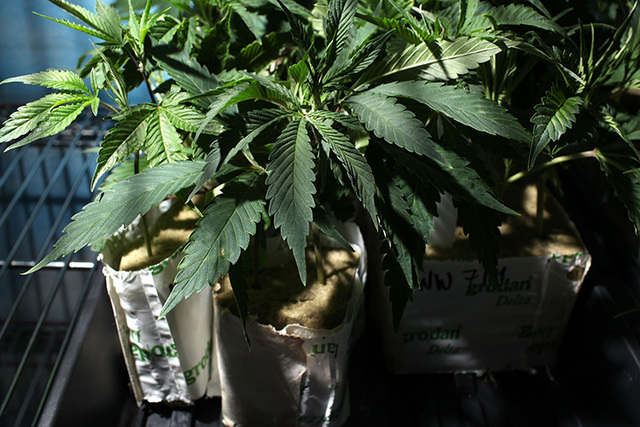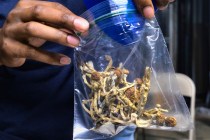Nevada legislators to face medical pot challenges

CARSON CITY — Medical marijuana dispensaries are on the verge of becoming a reality in Nevada but that doesn’t mean the smoke has cleared on a number of pressing issues related to the medicinal use of the drug.
From concerns about what some argue is Nevada’s indefensible standard for driving under the influence of marijuana to whether college students should be able to use medicinal marijuana on campus, a whole array of issues will likely come forward for debate in the 2015 session of the Nevada Legislature.
The Advisory Commission on the Administration of Justice chaired by Sen. Tick Segerblom, D-Las Vegas, recently opted not to take a position on these and several other proposals presented by a subcommittee. The commission, comprised of medical marijuana advocates and law enforcement officials, among others, did not find any common ground on the recommendations.
But Segerblom, who currently serves as the chairman of the Senate Judiciary Committee, said he will bring forward all of the recommendations for hearings in the 2015 session. No action is likely on any of the proposals before the dispensaries begin operating early next year.
The state received a total of 519 applications statewide for medical marijuana businesses, including cultivation facilities and labs, by an October deadline. Of that total, 135 were for dispensaries to be operated in Clark County and the incorporated cities, where 40 dispensaries will be allowed to operate.
The state is expected to announce the provisionally licensed marijuana businesses this month, allowing the state-approved applicants to move forward with local approvals in the various jurisdictions, which are expected to take three to four months.
At least some of the recommendations of the subcommittee are controversial, and chances for success on the proposals could hinge on whether Republicans or Democrats control the Legislature next session, although there was bipartisan support for Segerblom’s dispensary bill in the 2013 session.
Party control of the Senate and Assembly will be decided in the general election. Democrats hold majorities in both houses now, but low voter turnout could change that Tuesday.
Resistance from the law enforcement community, which was seen at the recent commission meeting when the proposals were discussed, could also doom their chances with lawmakers.
Douglas County District Attorney Mark Jackson, who serves on the commission, said at the meeting that the recommendations were not vetted by the panel and that they are controversial for representatives of law enforcement, prosecutors and victims of crime. He suggested that the issues be deferred to lawmakers.
The subcommittee also proposed:
■ Authorizing the sale and transportation of medical marijuana across county lines
■ Extending the time frame by which medical marijuana patients can grow their own supply from March 2016 to March 2018
■ Establishing exceptions for medical marijuana cardholders for consideration in various proceedings, including drug court, child custody, child abuse and neglect, foster care and offender program eligibility
■ Removing any prohibitions in employment contexts for employees who lawfully use medical marijuana
■ Establishing a regulatory structure, similar to that used by the state Gaming Control Board, to oversee and regulate the medical marijuana program
Segerblom said all the recommendations are worth review by lawmakers next year.
“How can you have legal medical marijuana on the one hand, and they say you can’t use it on campus?” he said. “It makes no sense to me. We’re not going to force our citizens to be second class for working in gaming or going to college.”
But allowing medical marijuana on the campuses of the Nevada System of Higher Education would be a concern for the institutions. The use, possession or cultivation of marijuana is prohibited by federal law at institutions which receive federal funding for student financial aid.
The Board of Regents recently adopted a policy that expressly prohibits the use, possession or cultivation of medical marijuana at state higher education facilities or at state college-sponsored activities.
Segerblom said a priority for change will be the state’s “per se” law, which automatically assumes a driver is under the influence of marijuana if a blood test shows the presence of what critics say are minimal levels of the drug in a driver’s system.
Segerblom said Nevada should follow California’s lead and adopt legislation that says that police must first determine that a driver is impaired in the field before seeking a blood test to determine if marijuana is present.
The commission’s subcommittee on medical marijuana voted 9-to-3 in August to seek such a change in the 2015 session.
All the issues raised by the subcommittee need a hearing, he said. “These issues aren’t going to go away,” Segerblom said. “They are going to get bigger and bigger.”
Contact Capital Bureau reporter Sean Whaley at swhaley@reviewjournal.com or 775-687-3900. Find him on Twitter: @seanw801.


















